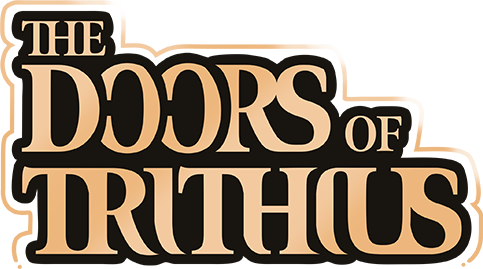Dev Blog
Reading & Knowledge
Sep 6, 2022If you’ve seen the last update the knowledge system has been added to the game. By knowledge system, I mean the study of books to gain knowledge, and a set of passive abilities that can be unlocked by spending your knowledge.
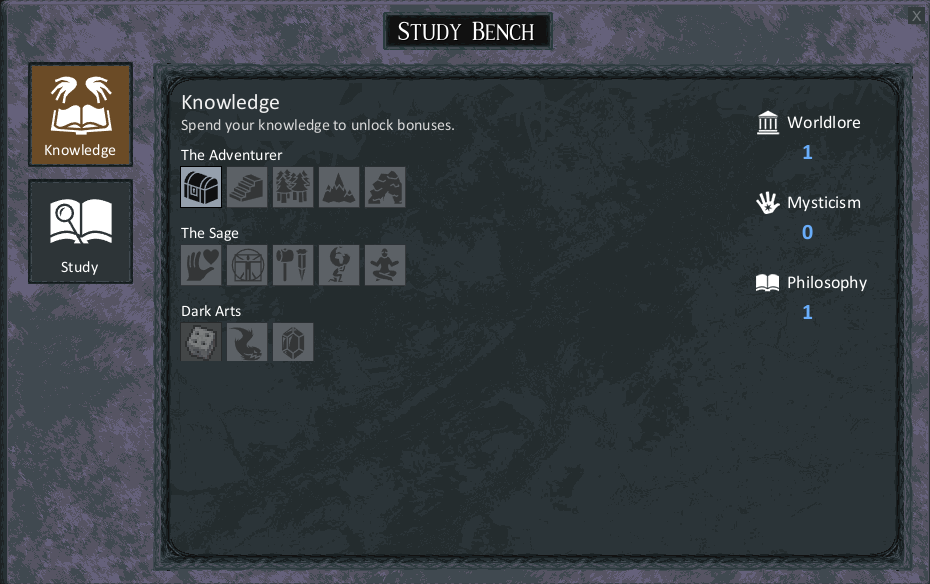
In this post I want to explain the reasoning behind this system, and where I see it leading moving forward.
The Problem
Previously, Reading was the one skill which had no upgrades to spend focus points on. As players pointed out, this didn't feel right. But the reason Reading did not yet have abilities, was I knew the underlying mechanic was lacking.
The Primary problem as I saw it, was that reading a book was instant. There is no required planning or investment over time. If all the player does is click a book and gain a reward, it’s too simple. Not only in terms of gameplay mechanics, but the feeling itself is too simple.
For those players who invest in reading I wanted to create the possibility of feeling like a fantasy scholar: hunting down texts, unlocking ancient knowledge, crawling through temples looking for a specific text. This, of course, is the goal. Not every player will fully engage with every system, nor will every player take on the roleplay feeling of their character, but I definitely wanted it be possible.
So, the question became: how to allow players to become invested in Reading as a skill? How do I allow them to create a relationship to books and knowledge?
Studying
The answer was that unlocking a reward from a book needed to take time. And during that waiting time I wanted the
book in the player’s inventory. I wanted the player to see the unlocking progress, to get excited and involved in
the prospect of unlocking its reward. Therefore, the concept of “studying” was a perfect fit.
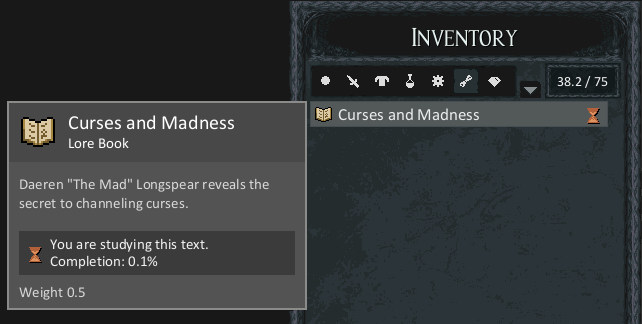
Studying had the secondary benefit of opening up access to all books to all players. Previously books had a reading level requirement to read. This didn’t feel right to me because I wanted all players to have access to the lore. With the studying mechanic, now simply seeing the text on the page was accessible to everyone, regardless of their character.
Knowledge Points
But what is the player unlocking by studying a book?
In earlier designs, I was working toward a unique passive ability associated with every book. For example, studying the book on flowers gives a Botany perk, studying a book about ancient geography reveals a new dungeon on the map. The problem here, is that there are too many books, and not enough abilities. Second, some books are poems or political, for which its very hard to come up with matching abilities.
The solution was for books to unlock some kind of point/currency, which can then be spent on rewards. This too, didn’t feel right to me, because it made all books the same. If a 300 year old poem like “Mother of Duality” gives 4 points, what does a tongue-in-cheek political letter like “The Island of Insanity” reward? The two are on a different spectrum.
This is how I arrived at a final solution of dividing
knowledge in to 3 categories: Philosophy, Mysticism, and Worldlore. These categories came from my attempts to
organize the existing books. I grouped the books by how they “felt”, then tried to give these groups names. When I
arrived at the word “worldlore” the rest fell in place. “Worldlore” brings together the political, historical, and
geographical types of books into one umbrella.
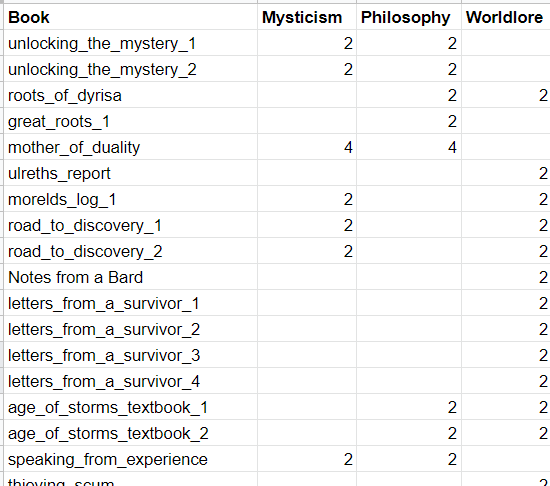
The complexity of any gameplay system must bring benefit equal to that complexity, and 3 types of knowledge was to my mind about the maximum allowed complexity for a reading/studying/unlocking system.
With 3 types of knowledge, the player can still choose a path, search for specific books, and plan a “build” so-to-speak, without having to learn or track too much.
The Study Bench
One other way this system is a nice fit for DoT, is the study bench which is used by the player to select a book to
study or to unlock knowledge abilities. Since many existing skills (Cooking, Alchemy, Quartermastery, Enchanting)
require a specific item in the world to interact with the skill, it felt right to do the same for reading.
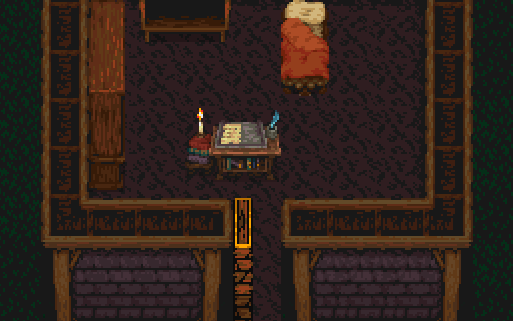
But what is the benefit, you might ask. Why make the player visit a specific location to spend their knowledge points or study a new text?
The answer is twofold:
- Connecting to the world. If
interaction with a gameplay system is primarily through UI – especially if that UI can be opened at any time – the
UI begins to feels separate from the game, like a secondary mini-game floating on top of the world, and not a part
of the world.
The addition of a study bench means a scholar now has a reason to visit other scholars (to use their study bench), to plan specific routes in dungeons, and to remember specific locations. Mastering Reading now means interacting with the actual gameplay world, and not simply making decision in a user interface.
- Time Investment. One problem I am seeing develop in DoT is there is little downside to taking on every skill. To make characters more unique, one method is to add costs to these skills. Time investment is a great way to do this. The Botany skill requires picking flowers, the Cooking skill requires attaining ingredients and recipes, and Reading now requires finding books and study benches. This takes real effort, beyond simply playing the game as normal for a little longer to gain more XP, you have to play the game differently. Playing as a scholar is not the same game as a pure warrior.
Extensibility
A final word on extensibility. As far as possible, I am designing The Doors of
Trithius to be game that can be extended and built upon over time. The knowledge system is a great way to do this,
since new books and knowledge abilities can seamlessly be slot in. A new region now means not only new enemy types,
traps, weapons, etc, but it also means new books, lore, and knowledge abilities.
Enchanting
June 22, 2022Since the reward for the upcoming dungeon will be enchanting crystals, it's apparent that if these crystals are going to have any value it was time to get started on the enchanting skill.
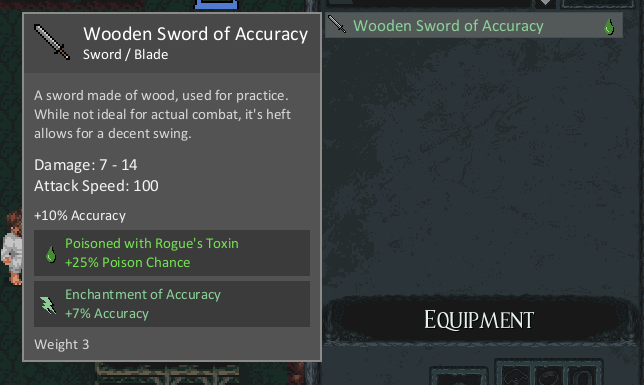
If you’re reading this you’re probably already familiar with Enchanting from other RPG games. The player uses an enchanting table to add enchantments to items and armor which add customized bonuses or power-ups.
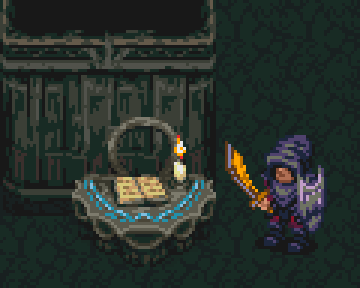
Enchanting is especially appealing to the min/maxer type of players who like to have the best gear. If a player is willing to put in the effort, enchanting allows them to create extremely powerful and tailor-made gear.
Beyond using the skill itself, enchanting also supports a unique type of experience - that of finding enchanted items. Opening a loot chest and finding a rare and enchanted item is an exciting experience. It also teaches the power of enchantments to players who might otherwise not have invested in the skill.
Goals
In the back of my mind I had a bucket of things I knew I wanted for enchantments:
- All players should sometimes find enchanted items (the enchanting skill is not required).
- Investing in the enchanting skill allows for more customization.
As for the skill itself, I had the following qualities in mind:
- Item sink – each enchantment requires different unique items.
- Uses crystals – enchanting requires special crystals, giving a reason to enter temples and caves to collect crystals.
- Complexity – the enchanting skill should have enough complexity to be interesting to players who use the skill. In other words, playthroughs should feel different to enchanting players as opposed to non-enchanting players. There must be room for players to be efficient, clever, ie. to game the system and play in line with their personality.
- Simplicity – enchanting should not be so complex it is hard to learn, or cannot easily be explained through a user-interface.
- Scaling – the same enchantment bonus, for example +Dodge Chance, should not always be the same amount. For example, a high level enchanter might be able to create an item with +10% Dodge Chance, whereas a low level enchanter creates an item with +2% Dodge Chance.
- Not Just Stats – some enchantments should go beyond raw numbers, and have interesting interactions with the world. I don’t want to reduce combat to purely stat checks, so there needs to be triggered enchantments or ways that enchantments relate to the context of a fight.
As it turns out, hitting all of these goals is not easy. And the system went through several designs before reaching the current approach.
Here I’ll discuss two of the decisions behind enchanting.
Potency
Problem 1 – What does levelling enchanting do?
Originally I wanted applying enchantments to weapons or armor to hae a chance to fail. The problem with this is that it can feel really shitty for players. It’s the same reason we don’t have burnt food in cooking. Instead, with cooking, we flipped it – so the random event was good (a potent version of the item is created) – instead of the random event being bad.
But without a chance to fail, how do enchanters get better? What does levelling enchanting do?
Problem 2 – How do enchanters know how strong their enchantments will be?
I also didn't want enchantments to have stats scaling along a continuous spectrum. For example, in Skyrim all enchantments scale based off your level. The problem with this is visibility. It’s not clear to the player what the min and max power level of each enchantment is, and how much value they will get from levelling the skill, since all they see is the output ("I guess I get +8% damage now instead of +6%").
The answer was potency.

Instead of a spectrum of possible values, each enchantment type is broken into 3 potency tiers, with each potency tier having it’s own enchanting requirement level.
Here's how it looks in the context of the full crafting UI:
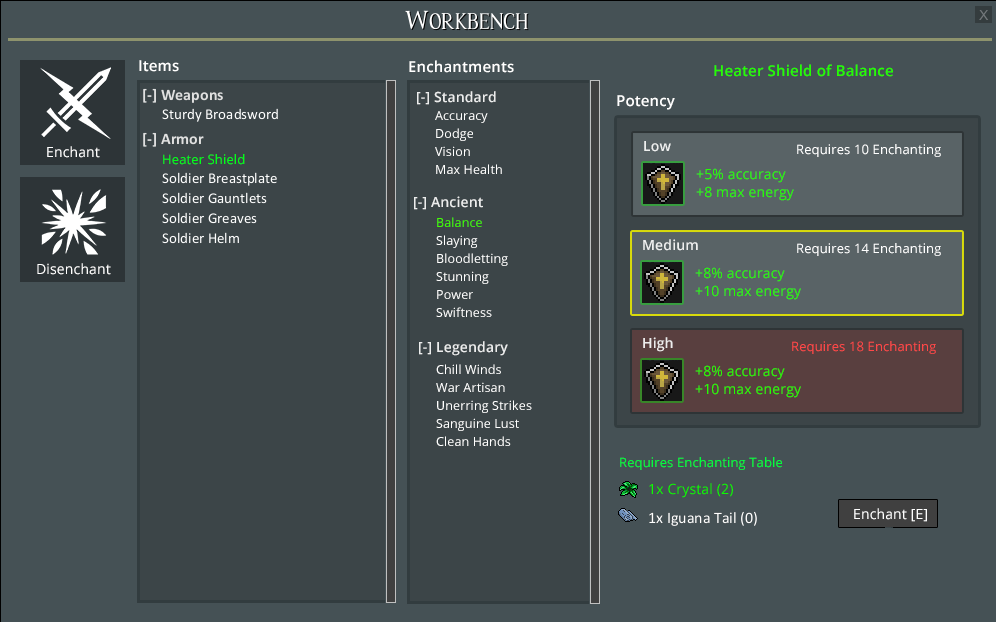
In short, the potency system:
- Gives players a reward for levelling enchanting without introducing failures.
- Allows players access to what otherwise would be powerful enchantments at a lower levels (since they can craft a low potency version of it)
- Gives the players options for levelling, ie. using lower potency enchantments to grind vs high potency.
- Provides visibility, since players can see exactly what each potency does.
For these reasons it's feels like a great approach.
Enchantment Types
Alright, we have our potency. But what will be the available enchantment types?
The easy approach it to simply make an enchantment for each type of stat. And this isn’t terrible, because it provides enormous flexibility to players. Based on their build players can hunt down the exact stat they want.
However, I knew for enchantments to really be exciting, there needed to be something more. Therefore the current version is a combined approach.
Low level enchantments are (called “Standard Enchantments”), and buff a single stat.
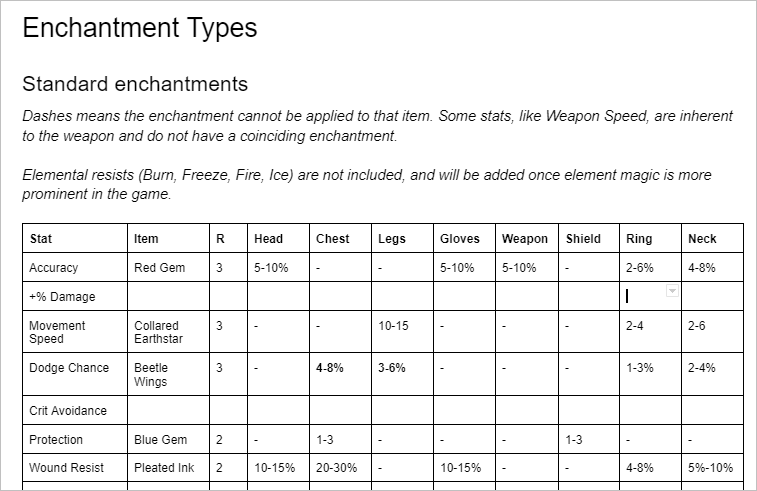
Medium tier enchantments (called “Ancient Enchantments”) buff two or more stats, sometimes offering a negative with a positive.
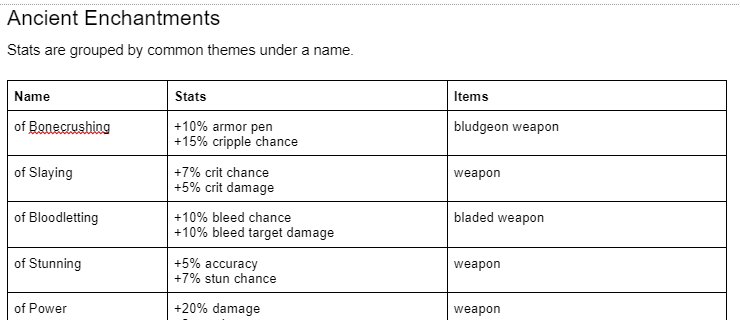 The Highest Tier enchantments (called “Legendary Enchantments”) have a triggered effect.
The Highest Tier enchantments (called “Legendary Enchantments”) have a triggered effect.
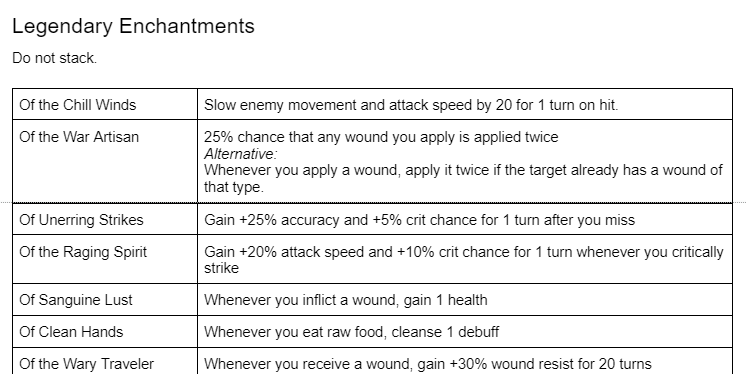
If players want a single stat, they can find standard enchantments and do so. But the more powerful enchantments will have more limitations and/or risk involved.
Equipment Slots
The numbers for enchanting have been balanced under the assumption of an additional two ring slots, and a necklace slot, which is to say the upcoming update will include a new ragdoll equipment UI, along with these new item types.
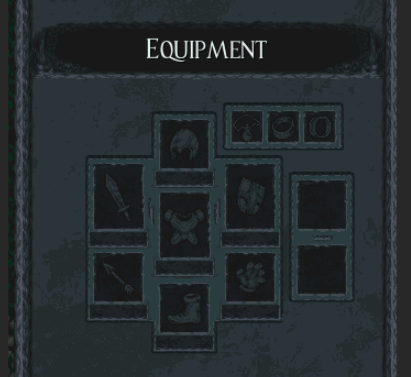
Since this is getting long I’ll end it here for now, probably to be continued with a second post. In short: enchanting is a huge update, relates to almost everything else in the game, will include a tiered potency system, and is being expertly balanced to be the bestest version of itself it can be.
